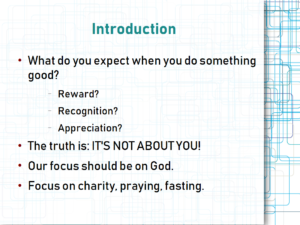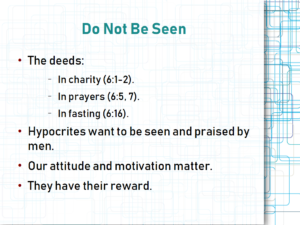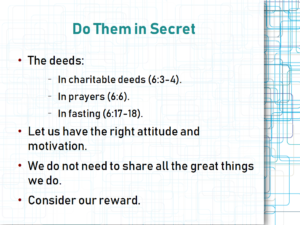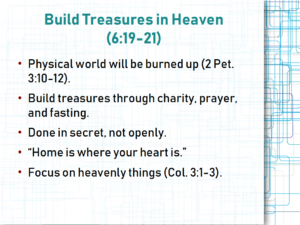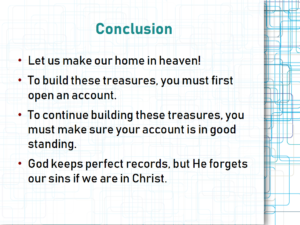How to Build Heavenly Treasures
Matthew 6:1-21
Whenever we do something right and good, we often want credit, to be recognized.
This a natural desire that we all have—I did something, I should be rewarded.
This led to many Jews of that time to call attention to their good deeds.
The truth is, when doing these good deeds—IT’S NOT ABOUT YOU!
Jesus tells us how to do these good works to remove the focus from us, and place it upon God.
We do this by building our treasures in heaven.
This is done if we act properly in charity, prayer, and fasting.
Body.
Do not do good works to be seen.

In charitable deeds (6:1-2).
Hypocrites do this only to be seen.
They sound trumpets when they give.
Their reward is the praise of men (not of God).
We may justify such things by saying we are helping the poor anyway.
But our attitude matters.
Hypocrites do not care about the poor.
They only care about getting the credit for doing good.
In prayers (6:5, 7).
Hypocrites do this only to be seen.
They stand in the synagogue (church) and on street corners when they pray.
Walgreens has a policy that they will only open a store on a street corner. Why? So they can be easily seen.
Again, their reward is praise of men (not of God).
Do not pray in vain repetitions.
Many words do not guarantee being heard by the Lord.
They do not care about speaking with the Lord, not honestly seeking His help or guidance.
They are simply seeking credit for flowery, ostentatious prayers.
In fasting (6:16).
Hypocrites want you to know they are fasting.
They disfigure their faces, making it apparent that they are fasting.
Fasting has fallen out of favor among many of us, I think (though if we are following this passage, who would know?).
Some denominations practice Lent, where they give up something for 40 days to remember Jesus’ fasting 40 days in the wilderness.
It begins on Ash Wednesday and ends at Easter.
On Ash Wednesday, the priest will take ash and draw a cross on the participants’ foreheads.
Is this not disfiguring one’s face?
They wish to be seen, and they have their reward from men (not from God).
In charitable deeds (6:3-4).
Do not let your left hand know what your right hand is doing.
This is an aphorism meaning to do something very secretly.
This seems to contradict Jesus in Matt. 5:16.
But the idea is, simply put, to have the right attitude in giving.
Do charitable works in secret, but your goal should be to help, not to be seen.
One does give in worship and it is often seen.
Don’t brag that you give or how much you give.
Don’t make a big deal when you drop money in the collection plate.
I used to only put cash in there because it is more anonymous.
Checks are fine, but it relies on the discretion of the one counting.
In prayers (6:6).
Prayer closet – some people have literally taken a room dedicated for prayer.
This is a great idea, but not explicitly what Jesus admonishes us to do.
The word for “room” (ταμεῖον) is a chamber or secret room—KJV “closet.”
Jesus is urging us not to pray for others to hear, to pray in secret.
Jesus then goes into how to pray (covered later).
Your attitude is important here, too – prayer is between you and God.
There are public prayers in worship.
In these public prayers, you are leading us all in communication with God.
No need to speak in flowery language.
It is okay to use flowery language if your attitude is not to impress men, but to communicate with God while leading others in that communication.
There is a line, but that is a matter of judgment.
In fasting (6:17-18).
Jesus says that we should anoint our head and wash our face.
This is another way of saying that we should bathe, do not look haggard or look as though we are fasting.
Do not brag about fasting—this is difficult for me.
If I am hungry I will express that—often showing frustration and irritability (hangry).
If I’m doing a special diet, it’s difficult for me not to discuss it (Whole30).
Fasting isn’t a “diet” per se, but it has some similarities concerning food.
This is because it is on my mind, and I talk about much of what’s on my mind.
I do not intentionally brag, but I do talk about it which could be considered bragging.
This does not mean you shouldn’t fast.
Fasting is accompanied by prayer.
It is a way to clear the mind, focus it on a particular thing.
It is a sign of devotion to God—but it should be done in secret.
Build heavenly treasures (6:19-21).

When we think of building treasures, we think of making money and investing.
Moth and rust destroy these things.
Thieves steal them.
It is true that things decay, so why build up such treasures neglecting what’s truly important?
We know how to build up such material blessings, but how do you build up heavenly treasures?
The answer is in charitable deeds, prayers, fasting—doing so in secret.
The reward we receive is from God, not from men.
The hypocrites have their reward by doing these things openly, announcing them, bragging about them.
The Christian ought to build up his heavenly reward by doing these things secretly.
It is counterintuitive to build up treasures by giving things away, but that is exactly how it works for the Christian.
Build up those treasures, so your heart will be in heaven.
“Home is where your heart is.”
Our home is in heaven, and we build up those treasures to make heaven our home.
If we do those things openly, build only material wealth, our hearts long for this world – our reward is here, our home is here.
We get attached to material things when we should be attached to heavenly.
It is not wrong to build material wealth, but it is if we neglect heavenly wealth.
Let us make our home in heaven.
We can do this by doing charitable deeds, praying, fasting in secret.
This is not the only step, nor is it the first, but it is important.
We start that journey by (plan of salvation).
We continue that journey by engaging in these acts of devotion and worship.
Our treasures will be laid up for us.
God keeps a record, and He never forgets – nothing ever falls through the cracks.
Nothing except our sin if we become a Christian, and continually repent of our sins.
